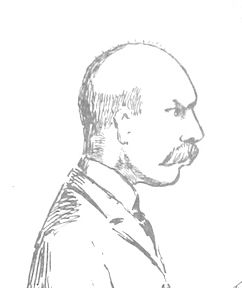Frederick Anderson

Fred Anderson was the son of a well-to-do, Paisley-born, Cotton and Calico Merchant and Manufacturer and a Glasgow mother. He was born in 1855 in Glasgow Barony and was still there at age five. But by twelve the whole family had moved to England, to Wilmslow in Cheshire, he by fifteen already working as a Commercial Clerk.
However, whilst there is no evidence of the rest of the family returning North until 1891, his mother by then a widow, by 1872 at seventeen Fred himself clearly was back in Glasgow and playing as a forward for Clydesdale F.C., founded that same year. That is until the following year when he joined Queen's Park.
The timing was interesting. Queen's Park was going through ructions. In early 1874 its and Scotland's then captain, Robert Gardner, took himself off and to Clydesdale with Fred Anderson also switching back and Gardener's friend and fellow, former Queen's Park committee member, David Wotherspoon, following on. However, the changes did not stop both Gardner and an eighteen year-old Anderson forming part of the Scotland eleven selected to face England at home in 1874. Played at Partick's Hamilton Crescent England actually went ahead after half an hour but Scotland replied with two goals in five minutes and a win. Angus McKinnon hit the second and Fred Anderson the first, which makes him doubly unique. Still to this day he remains the youngest ever Scot to have scored an international goal, having also been the first ever of any age to have done so for his country on Scottish soil.
In fact it was to be Anderson's only cap and after an appearance a fortnight later in the Scottish Cup Final, alongside both Gardner and Wotherspoon, losing 2-0 and to Queen's Park that would be it. He seems at not yet twenty to have stepped away completely from the game, returning South, devoting himself to business that in 1881 would take him to Shang'hai in China for much of the rest of his working-life and set him on his way to a substantial fortune.
In China it is known he continued to enjoy sport. He played some football, a lot of cricket, becoming Secretary and later President of Shang'hai Cricket Club, and in 1905 was President of the city's rugby club. He was also active in its business community. He became chairman of the Shang'hai Municipal Council. And in the meantime he married, his bride Irish-born Sophia Ward, the wedding in 1896 in London, he aged forty.
With Sophia he was to have a son and three daughters, the parents clearly spending their time between Britain and the East. Their boy and one daughter were born in China, their two other daughters in England. But time spent in the former after the turn of the century was considerable. In 1901 and 1911 both are recorded London in Victoria and South Kensington respectively. Indeed, by the latter date he was fifty-five, seemingly able two years earlier to have returned from Shang'hai permanently, although he did by becoming a governor of London's School of Oriental and African Studies retain a link with the Far East.
Yet even in 1911 he remained recorded as an East India Merchant so not retired, perhaps involvement in Malaysian rubber production now taking up his time and energy, and they, he and Sophia, seem still to be splitting their time, now between town and county. Indeed by 1939 they were staying both in not one but two houses in Princes Gate again in South Kensington and also, it seems, had acquired a clearly substantial place in Berkshire, south of Hungerford, for it was there that Fred is finally recorded as a East India Merchant (Retired) and where he would pass away just a year later in 1940 at the age of eighty-four. And now we return to his fortune. Frederick Anderson left an estate of £261,000, the equivalent today of about £17.5 million, more than enough to keep Sophia in comfort, she dying back in London in Chelsea in 1967 at the venerable age of ninety-six.
Birth Locator:
1855 - 82, Queen's Terrace, Barony, Glasgow
Residence Locations:
1861 - 82, Queen's Terrace, Barony, Glasgow
1871 - 167, Hough, Wilmslow, Cheshire
1881 - Shang'hai
1891 - Shang'hai
1901 - 119, Victoria St., London
1911 - 52, Queensgate, S. Kensington, London
1939 - 70 & 71, Princes Gate, London
1940 - Standen Manor, Hungerford, Berkshire
Death Locator:
1940 - Standen Manor, Hungerford, Berkshire
Grave Locator:
St. Mary's Churchyard, Chilton Foliat, Wiltshire
Back to the Queen's Park & Southern Suburbs Trail
or the SFHG Home page